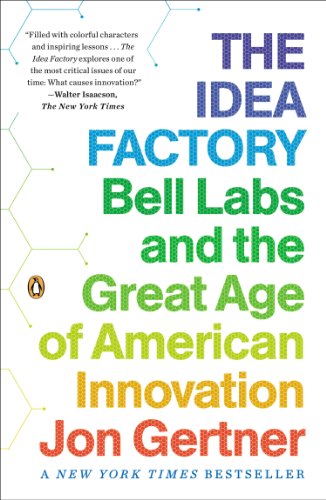
The Idea Factory: Bell Labs and the Great Age of American Innovation

By intention, everyone would be in one another’s way. Members of the technical staff would often have both laboratories and small offices—but these might be in different corridors, therefore making it necessary to walk between the two, and all but assuring a chance encounter or two with a colleague during the commute. By the same token, the long co
... See moreJon Gertner • The Idea Factory: Bell Labs and the Great Age of American Innovation
New titles might not have increased his influence. By the start of the 1960s Baker was engaged in a willfully obscure second career, much like the one Mervin Kelly had formerly conducted, a career that ran not sequentially like some men’s—a stint in government following a stint in business, or vice versa—but simultaneously, so that Baker’s various
... See moreJon Gertner • The Idea Factory: Bell Labs and the Great Age of American Innovation
Yet understanding the circumstances that led up to that unusual winter of 1947 at Bell Labs, and what happened there in the years afterward, promises a number of insights into how societies progress. With this in mind, one might think of a host of reasons to look back at these old inventions, these forgotten engineers, these lost worlds.
Jon Gertner • The Idea Factory: Bell Labs and the Great Age of American Innovation
“IT IS THE BEGINNING of a new era in telecommunications and no one can have quite the vision to see how big it is,” Mervin Kelly told an audience of telephone company executives in 1951. Speaking of the transistor, he added that “no one can predict the rate of its impact.” Kelly admitted that he wouldn’t see its full effect before he retired from t
... See moreJon Gertner • The Idea Factory: Bell Labs and the Great Age of American Innovation
Essentially Kelly was creating interdisciplinary groups—combining chemists, physicists, metallurgists, and engineers; combining theoreticians with experimentalists—to work on new electronic technologies.
Jon Gertner • The Idea Factory: Bell Labs and the Great Age of American Innovation
One shouldn’t necessarily think of information in terms of meaning. Rather, one might think of it in terms of its ability to resolve uncertainty. Information provided a recipient with something that was not previously known, was not predictable, was not redundant. “We take the essence of information as the irreducible, fundamental underlying uncert
... See moreJon Gertner • The Idea Factory: Bell Labs and the Great Age of American Innovation
For Scaff and Theurer—and, in time, the rest of the solid-state team at Bell Labs—one way to think of these effects was that purity in a semiconductor was necessary. But so was a controlled impurity. Indeed, an almost vanishingly small impurity mixed into silicon, having a net effect of perhaps one rogue atom of boron or phosphorus inserted among f
... See moreJon Gertner • The Idea Factory: Bell Labs and the Great Age of American Innovation
From the start, Jewett and Arnold seemed to agree that at West Street there could be an indistinctness about goals. Who could know in advance exactly what practical applications Arnold’s men would devise? Moreover, which of these ideas would ultimately move from the research department into the development department and then mass production at Wes
... See moreJon Gertner • The Idea Factory: Bell Labs and the Great Age of American Innovation
Physical proximity, in Kelly’s view, was everything. People had to be near one another. Phone calls alone wouldn’t do. Kelly had even gone so far as to create “branch laboratories” at Western Electric factories so that Bell Labs scientists could get more closely involved in the transition of their work from development to manufacture.